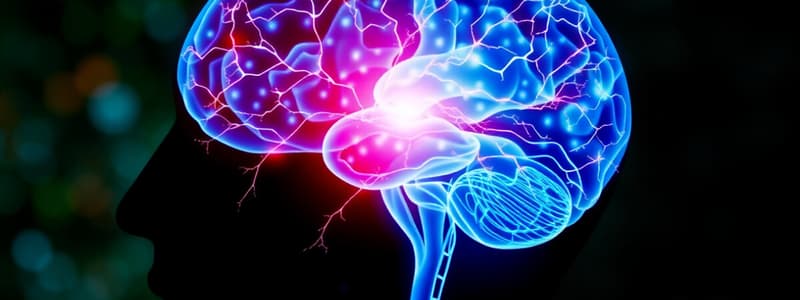Podcast
Questions and Answers
What is the main focus of physiological psychology?
What is the main focus of physiological psychology?
The relationship between the brain, body, behavior, and mind.
Who was Phineas Gage?
Who was Phineas Gage?
A railroad worker who survived an accident involving a spike through his skull.
What was a common treatment for mental illnesses before the mid-20th century?
What was a common treatment for mental illnesses before the mid-20th century?
Frontal lobotomy.
How many neurons are approximately in the human brain?
How many neurons are approximately in the human brain?
What determines neuronal circuits during development?
What determines neuronal circuits during development?
Neurons communicate only through electrical signals.
Neurons communicate only through electrical signals.
What may trigger a reflex response?
What may trigger a reflex response?
Life experiences can ______ the nervous system.
Life experiences can ______ the nervous system.
What type of brain plasticity involves changes in physical structure?
What type of brain plasticity involves changes in physical structure?
Which part of the brain is responsible for memory?
Which part of the brain is responsible for memory?
What does the prefrontal cortex regulate?
What does the prefrontal cortex regulate?
The amygdala is involved in rational thinking.
The amygdala is involved in rational thinking.
What are the two types of brain plasticity?
What are the two types of brain plasticity?
Flashcards are hidden until you start studying
Study Notes
Physiological Psychology
- The biological approach to studying human behavior.
- Focuses on the link between brain, body, behavior and mind.
- 19th Century:
- Phineas Gage survived a spike through his skull, revealing the connection between brain damage and behavior.
- Franz Joseph Gall linked the skull's morphology to personality traits, one of the first to consider the brain as the center of mental activities.
- Mid 20th Century:
- Psychosurgery, specifically frontal lobotomy, was used to treat mental illness like depression, schizophrenia and mania.
- Egas Moniz, who pioneered the procedure, was killed by one of his lobotomized patients.
Neuroscience Core Concepts
- The brain is the most complex organ in the human body.
- It consists of roughly 86 billion neurons that are constantly in use.
- Neurons form circuits and share information.
- The nervous system's function involves coordinated action of neurons across brain regions.
- It influences and is influenced by all other body systems, such as the cardiovascular, endocrine and gastrointestinal systems.
- The intricate human nervous system evolved from a simpler one.
- Brain malfunctions can lead to various disorders with significant societal and economic impacts.
- Neurons communicate through electrical and chemical signals.
- Genetically determined circuits are the foundation of the nervous system.
- Neuronal circuits form during development and are modified by environmental interactions.
- Sensory circuits transmit information to the nervous system from the senses (sight, touch, hearing, smell, taste). Motor circuits send information from the nervous system to muscles and glands.
- The simplest circuit is a reflex, a direct stimulus-response.
- Complex responses involve integrating information from multiple circuits.
- Interactions among neurons occur on scales from milliseconds to months.
- The brain is organized to recognize sensations, initiate behavior and store and access memories.
- Life experiences shape the nervous system.
- Differences in genes and environment make each brain unique.
- Most neurons are generated early in life and last a lifetime.
- The brain can recover from injury or disease.
- Brain structure and function are maintained through mental and physical activity.
- Peripheral neurons have greater regenerative capacity compared to neurons in the brain and spinal cord.
- Neuronal death is a natural part of development and aging.
- New neurons are generated throughout life, with their production regulated by hormones and experience.
Neuroplasticity
- Brain's ability to change and adapt.
- Types of brain plasticity:
- Structural plasticity: Changes in physical structure caused by experience or memory.
- Functional plasticity: Brain function shifts from damaged areas to undamaged areas.
Trauma's Impact on the Brain
- Prefrontal Cortex: Area responsible for rational thinking and emotional regulation. In PTSD, this area exhibits reduced volume.
- Hippocampus: Involved in memory and differentiating past from present. Trauma exposure can shrink this area.
- Amygdala: Wired for survival, responsible for fear responses. Increased activity leads to heightened PTSD symptoms.
Intelligence
- A product of the brain's ability to reason, plan, and solve problems.
- The brain integrates all available data, including senses, emotions, instincts, and past experiences.
- Emotions stem from the brain's value judgments manifested as feelings ranging from basic emotions like love and anger to complex emotions like empathy and hate.
- The brain learns from experiences and predicts appropriate actions.
- Consciousness is dependent on normal brain function.
Communication
- The brain enables communication through languages.
- The human brain can articulate knowledge through spoken and written languages.
- The brain is the basis of our complex social behavior and its ability to form cultures.
- Brain, behavior and mind are intertwined.
- The study of the brain is crucial for understanding the human condition.
Neural Development Stages
- Neurulation: Process of forming the neural tube, which develops into the CNS.
- Neuronal proliferation: Increase in the number of neurons.
- Neural migration: Movement of neurons to their final location.
- Myelination: Formation of myelin sheath around axons, which speeds up nerve impulse transmission.
- Synaptogenesis: Formation of synapses, connections between neurons.
- Apoptosis: Programmed cell death of neurons.
Studying That Suits You
Use AI to generate personalized quizzes and flashcards to suit your learning preferences.




